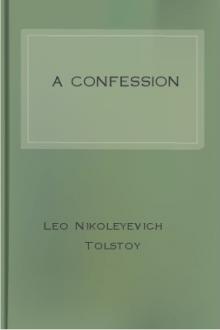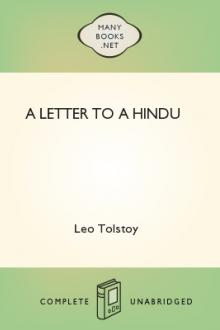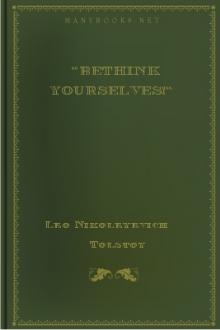A Confession by Leo Nikoleyevich Tolstoy (best sales books of all time txt) 📕

- Author: Leo Nikoleyevich Tolstoy
- Performer: -
Book online «A Confession by Leo Nikoleyevich Tolstoy (best sales books of all time txt) 📕». Author Leo Nikoleyevich Tolstoy
see, for that alone is true. All else is false.
The two drops of honey which diverted my eyes from the cruel truth longer
than the rest: my love of family, and of writing — art as I called it — were
no longer sweet to me.
“Family”…said I to myself. But my family — wife and children — are also
human. They are placed just as I am: they must either live in a lie or see
the terrible truth. Why should they live? Why should I love them, guard
them, bring them up, or watch them? That they may come to the despair that I
feel, or else be stupid? Loving them, I cannot hide the truth from them:
each step in knowledge leads them to the truth. And the truth is death.
“Art, poetry?”…Under the influence of success and the praise of men, I
had long assured myself that this was a thing one could do though death was
drawing near — death which destroys all things, including my work and its
remembrance; but soon I saw that that too was a fraud. It was plain to me
that art is an adornment of life, an allurement to life. But life had lost
its attraction for me, so how could I attract others? As long as I was not
living my own life but was borne on the waves of some other life — as long
as I believed that life had a meaning, though one I could not express — the
reflection of life in poetry and art of all kinds afforded me pleasure: it
was pleasant to look at life in the mirror of art. But when I began to seek
the meaning of life and felt the necessity of living my own life, that
mirror became for me unnecessary, superfluous, ridiculous, or painful. I
could no longer soothe myself with what I now saw in the mirror, namely,
that my position was stupid and desperate. It was all very well to enjoy the
sight when in the depth of my soul I believed that my life had a meaning.
Then the play of lights — comic, tragic, touching, beautiful, and terrible
— in life amused me. No sweetness of honey could be sweet to me when I saw
the dragon and saw the mice gnawing away my support.
Nor was that all. Had I simply understood that life had no meaning I could
have borne it quietly, knowing that that was my lot. But I could not satisfy
myself with that. Had I been like a man living in a wood from which he knows
there is no exit, I could have lived; but I was like one lost in a wood who,
horrified at having lost his way, rushes about wishing to find the road. He
knows that each step he takes confuses him more and more, but still he
cannot help rushing about.
It was indeed terrible. And to rid myself of the terror I wished to kill
myself. I experienced terror at what awaited me — knew that that terror was
even worse than the position I was in, but still I could not patiently await
the end. However convincing the argument might be that in any case some
vessel in my heart would give way, or something would burst and all would be
over, I could not patiently await that end. The horror of darkness was too
great, and I wished to free myself from it as quickly as possible by noose
or bullet. that was the feeling which drew me most strongly towards suicide.
V“But perhaps I have overlooked something, or misunderstood something?” said
to myself several times. “It cannot be that this condition of despair is
natural to man!” And I sought for an explanation of these problems in all
the branches of knowledge acquired by men. I sought painfully and long, not
from idle curiosity or listlessly, but painfully and persistently day and
night — sought as a perishing man seeks for safety — and I found nothing.
I sought in all the sciences, but far from finding what I wanted, became
convinced that all who like myself had sought in knowledge for the meaning
of life had found nothing. And not only had they found nothing, but they had
plainly acknowledged that the very thing which made me despair — namely the
senselessness of life — is the one indubitable thing man can know.
I sought everywhere; and thanks to a life spent in learning, and thanks also
to my relations with the scholarly world, I had access to scientists and
scholars in all branches of knowledge, and they readily showed me all their
knowledge, not only in books but also in conversation, so that I had at my
disposal all that science has to say on this question of life.
I was long unable to believe that it gives no other reply to life’s
questions than that which it actually does give. It long seemed to me, when
I saw the important and serious air with which science announces its
conclusions which have nothing in common with the real questions of human
life, that there was something I had not understood. I long was timid before
science, and it seemed to me that the lack of conformity between the answers
and my questions arose not by the fault of science but from my ignorance,
but the matter was for me not a game or an amusement but one of life and
death, and I was involuntarily brought to the conviction that my questions
were the only legitimate ones, forming the basis of all knowledge, and that
I with my questions was not to blame, but science if it pretends to reply to
those questions.
My question — that which at the age of fifty brought me to the verge of
suicide — was the simplest of questions, lying in the soul of every man from
the foolish child to the wisest elder: it was a question without an answer
to which one cannot live, as I had found by experience. It was: “What will
come of what I am doing today or shall do tomorrow? What will come of my
whole life?”
Differently expressed, the question is: “Why should I live, why wish for
anything, or do anything?” It can also be expressed thus: “Is there any
meaning in my life that the inevitable death awaiting me does not
destroy?”
To this one question, variously expressed, I sought an answer in science.
And I found that in relation to that question all human knowledge is divided
as it were into tow opposite hemispheres at the ends of which are two poles:
the one a negative and the other a positive; but that neither at the one nor
the other pole is there an answer to life’s questions.
The one series of sciences seems not to recognize the question, but replies
clearly and exactly to its own independent questions: that is the series of
experimental sciences, and at the extreme end of it stands mathematics. The
other series of sciences recognizes the question, but does not answer it;
that is the series of abstract sciences, and at the extreme end of it stands
metaphysics.
From early youth I had been interested in the abstract sciences, but later
the mathematical and natural sciences attracted me, and until I put my
question definitely to myself, until that question had itself grown up
within me urgently demanding a decision, I contented myself with those
counterfeit answers which science gives.
Now in the experimental sphere I said to myself: “Everything develops and
differentiates itself, moving towards complexity and perfection, and there
are laws directing this movement. You are a part of the whole. Having learnt
as far as possible the whole, and having learnt the law of evolution, you
will understand also your place in the whole and will know yourself.”
Ashamed as I am to confess it, there wa a time when I seemed satisfied with
that. It was just the time when I was myself becoming more complex and was
developing. My muscles were growing and strengthening, my memory was being
enriched, my capacity to think and understand was increasing, I was growing
and developing; and feeling this growth in myself it was natural for me to
think that such was the universal law in which I should find the solution of
the question of my life. But a time came when the growth within me ceased. I
felt that I was not developing, but fading, my muscles were weakening, my
teeth falling out, and I saw that the law not only did not explain anything
to me, but that there never had been or could be such a law, and that I had
taken for a law what I had found in myself at a certain period of my life. I
regarded the definition of that law more strictly, and it became clear to me
that there could be no law of endless development; it became clear that to
say, “in infinite space and time everything develops, becomes more perfect
and more complex, is differentiated”, is to say nothing at all. These are
all words with no meaning, for in the infinite there is neither complex nor
simple, neither forward nor backward, nor better or worse.
Above all, my personal question, “What am I with my desires?” remained quite
unanswered. And I understood that those sciences are very interesting and
attractive, but that they are exact and clear in inverse proportion to their
applicability to the question of life: the less their applicability to the
question of life, the more exact and clear they are, while the more they try
to reply to the question of life, the more obscure and unattractive they
become. If one turns to the division of sciences which attempt to reply to
the questions of life — to physiology, psychology, biology, sociology — one
encounters an appalling poverty of thought, the greatest obscurity, a quite
unjustifiable pretension to solve irrelevant question, and a continual
contradiction of each authority by others and even by himself. If one turns
to the branches of science which are not concerned with the solution of the
questions of life, but which reply to their own special scientific
questions, one is enraptured by the power of man’s mind, but one knows in
advance that they give no reply to life’s questions. Those sciences simply
ignore life’s questions. They say: “To the question of what you are and why
you live we have no reply, and are not occupied with that; but if you want
to know the laws of light, of chemical combinations, the laws of development
of organisms, if you want to know the laws of bodies and their form, and the
relation of numbers and quantities, if you want to know the laws of your
mind, to all that we have clear, exact and unquestionable replies.”
In general the relation of the experimental sciences to life’s question may
be expressed thus: Question: “Why do I live?” Answer: “In infinite space, in
infinite time, infinitely small particles change their forms in infinite
complexity, and when you have under stood the laws of those mutations of
form you will understand why you live on the earth.”
Then in the sphere of abstract science I said to myself: “All humanity lives
and develops on the basis of spiritual principles and ideals which guide it.
Those ideals are expressed in religions, in sciences, in arts, in forms of
government. Those ideals become more and more elevated, and humanity
advances to its highest welfare. I am part of humanity, and therefore my
vocation is to forward the





Comments (0)